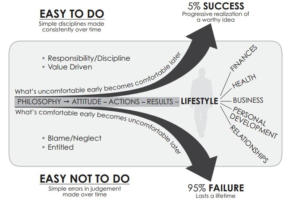Michal Stawicki's Blog, page 14
July 24, 2018
Is Continuous Self-improvement a Skill that Can Be Learned?
Yes and no.
No, because it’s not a skill. You cannot say that being a great doctor or a great basketball player is a skill. It’s a whole skillset that makes a person a doctor or player. There are many skills that mesh into being a person who continuously grows.
It’s not a habit as well, at least not in the literal sense of this word. It’s not a single activity that you repeat over and over again. But in the broad term, yes, it’s a habit, “a settled or regular tendency or practice; a usual way of behaving.” However, if we pick this meaning, it comes back to being someone who is dedicated to self-improvement.
And yes, you can learn that, because becoming someone is learning, isn’t it? No one was born a great doctor, pilot or a basketball player. Also, cultivating specific habits isbecoming. According to the word’s etymology, your habits denote who you are.
So, the best way to learn continuous self-improvement is to cultivate appropriate habits.
I. Habits of the Mind.
Who you become is more about your attitude than your action. You wouldn’t have let an overwhelming majority of first-year medicine students to make a surgery of your kid, would you? But in five years or so, this young man or woman will become a highly skilled surgeon… if they have the appropriate mindset that will push them through their studies.
At the beginning, we are all newbies and we fail often. But if you have the proper attitude, you will not stay failed.
Several habits that directly or indirectly help with keeping your mind on the course of self-improvement are:
Cultivating vision.
You won’t become someone else on a whim, there has to be a deeper purpose in your quest or you will not persevere.
I repeat my personal mission statement every day. I was on a progress fair in September, an event dedicated to personal development. I spoke with several coaches, authors, and entrepreneurs who had a stand. Every single one of them had their own mission statement.
Ask around, ask your workmates, neighbors, and family if they have their mission statement. I bet the ratio of people knowing their mission will be much lower among your peers (if it’s above zero, it’s already decent).
There are other ways of cultivating vision. Every day I read a few sentences from three books that shaped my personal philosophy, skim through about 100 quotes that helped in solidifying my worldview and look at my vision board.
The exact method is secondary. The must-have is to regularly refer to your vision of continued growth.
Meditation.
There is a zillion of benefits of meditation. You can focus better, your health is better and so on. But I consider the foremost advantage of meditation that you become more self-aware.
It’s so hard to get a grip on what’s going in your mind for normal Westerners (and with the globalization of the culture we all slowly became Westerners). Meditation deals with that. Close your eyes, breathe deeply and try not to think. Good luck.
Because you focus on nothing else and your thoughts emerge spontaneously, you cannot help but notice them. At last. It may be the first time that you are conscious of how they arise. Such self-knowledge is necessary if you want to improve, otherwise your subconscious beliefs and habits can torpedo all your good intentions.
Prayer.
It is like a mix of cultivating the vision (purpose) and meditation (self-awareness) with a divine element. A great mix, if you ask me.
II. Habits of the Body.
You need to be in a decent shape to improve continuously. It doesn’t mean you have to be 100% healthy. Some great people in the history were crippled in a way or another (e.g. Maya Angelou, Hellen Keller). It’s simply so much easier to grow when your body doesn’t hamper your progress.
Sleep well.
Only about 2% of the population have genes that allow them to function optimally with 6 and less hours of sleep a day. The rest of us need more.
Sleep needs are individual. Doctors say we should sleep 8 hours a day. Scientists found that in primitive cultures, where people don’t screw with their daily rhythms with artificial light, humans sleep 6.5-7.3 hours on average. Keep in mind that those folks also suffer much less stress than urban dwellers, live in an unpolluted environment and don’t eat processed foods. They also get a healthy dose of physical activities.
In modern culture, our minds and bodies experience much more of those negative factors and get too little the positive ones. Thus, we need more sleep to absorb all the ‘damage’ of our lifestyle.
Eat well.
Almost all diets are BS. One rule is true in every diet: don’t eat processed food. Of course, it’s close to impossible nowadays, but you should aim to minimize processed foods in your diet to the bare minimum.
Which foods are processed? Generally, those that weren’t alive a couple of days ago, or if they were processed, it was done by natural means. E.g. grain or groats that were dried.
Move well.
Sitting is a new smoking. I know best by myself. I sit almost every day over 10 hours a day.
Walking is a natural physical activity for humans and we don’t do that enough. Smuggle short and intensive exercises into your day. I do that with pushups, dips, and pull-ups. Move, move, move. Being a potato coach may not be a shortcut to death, but surely it’s a shortcut to low-quality life a few decades down the road.
Physical activity is connected with creativity. Almost every artist and entrepreneur admit that they got the best ideas while running, walking or working out.
III. Habits Mastery.
The fastest way to become dedicated to personal development is to create new habits, like the ones I instanced above. The fastest and most reliable way to develop a habit is to keep tracking of it, especially at the initial stage. Good habits don’t develop on their own, you need to put some conscious effort into it.
Don’t break the streak.
This is the basic level of habit tracking applicable practically for every habit. Whether you want to exercise, eat more vegetables, write 400 words a day, speak to a stranger or do a random act of kindness, you should have in place a practice of checking on yourself at the end of the day if you have done what you resolved for, or not.
It’s a powerful motivational technique. If you do something once and notice it, it’s not a big deal. But if you continue the next day and keep a record, that’s another story. You start to be attached to the outcome. If you build a streak of several days with your new habit, you will be more likely to continue. And each day you make the streak longer and your motivation grows too.
Keep a log.
This adds another level to your tracking. It’s not necessary nor wise to keep such a log for every habit you want to develop, because it puts an additional workload on your shoulders.
Keeping a log not only tells you if you have done your discipline but also how you’ve done it. It provides motivation, but also information.
I keep a writing log. Writing is an important part of my life and I want to keep sure I’m on track with this habit. In my writing log, I note down the length and topic of each of my writing sessions.
Thanks to this log I can tell my writing speed. I can also tell that since I started it in September 2013 my writing speed almost doubled and I write as fast in Polish and in English. Those data would’ve been unattainable for me if I haven’t kept the log.
KISS.
The rule of thumb is that your tracking cannot hamper your habit development. Keep it stupid simple!
If you exercise every day in your home gym, keep a wall calendar there and mark on it each day when you completed your workout. If you track your expenses, keep a pocket notepad with you and write down each purchase as soon as you make it. If you track your calories, have a Fitness Pal app on your mobile and put your entries right after a meal.
Tracking and doing your habit cannot be separated in time and space or it won’t work. Also, it must fit your lifestyle. Mingle your habit in your tracking into one activity. If you don’t have a smartphone, you obviously cannot have a Fitness Pal app on your mobile.
Keep it simple, don’t complicate and you will develop your habit faster and it will be more solid.
Continuous self-improvement is not a skill, it’s a lifestyle, it’s who you are. If you want to modify who you are, modify your habits.
Your attitude is more important than any other aspect, but you shouldn’t neglect your body. Your body is your support system. Without good shape and health, your growth is hanging on a thin thread instead of being reliably supported.
The post Is Continuous Self-improvement a Skill that Can Be Learned? appeared first on ExpandBeyondYourself.
July 10, 2018
Sixty First Income Report – April 2018 ($4437.83)
Are you curious about a 3-month delay? I explained it in my first income report.
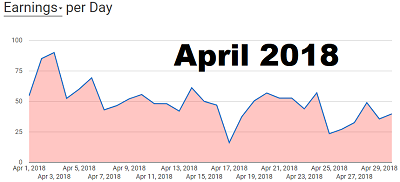 The first days of April 2018 were busy with calculating profits of my customers and preparing for my trip to the USA. I was able to issue almost all invoices. I ignored only one or two of the smallest customers, saving them for the next month.
The first days of April 2018 were busy with calculating profits of my customers and preparing for my trip to the USA. I was able to issue almost all invoices. I ignored only one or two of the smallest customers, saving them for the next month.USA
Traveling to the USA was a nightmare because of jet lag. I woke up at 3 am and my day was 27 hours long. To add insult to injury, I slept only 3.5 hours. A big mistake.
I got four longer naps during the flights, but it wasn’t enough. I felt like a zombie when I finally landed in Nashville at 6:30 pm CT.
Golf lesson from Aaron Walker
Still, I was ecstatic about meeting Aaron Walker and guys from my mastermind. Straight from the airport my new buddy, Chad Jeffers, took me to a mini golf facility for a pre-retreat meeting. I had a golf club in my hands for the first time in my life. Aaron gave me a few tips about the grip and swing
June 28, 2018
2 Simple Habits that Will Make You More Positive
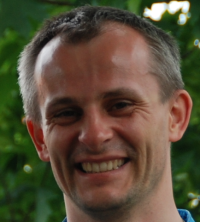 I’ll give you only two habits that will make you more positive, but they are immensely powerful and yet easy to implement at the same time. And they will provide 80% of results, so you can bother with chasing the remaining 20% after you have them firmly in place.
I’ll give you only two habits that will make you more positive, but they are immensely powerful and yet easy to implement at the same time. And they will provide 80% of results, so you can bother with chasing the remaining 20% after you have them firmly in place.
1. Gratitude Journal.
Shawn Achor, a guy who researched happiness for over a decade at scholar levels claims that:
Gratitude rewires your brain into positivity.
He instanced numerous research when scientists were able to turn around individual’s thinking from pessimistic into optimistic within a mere 30 days. One example was a child with pessimism gene. Another was an 80-year old guy with the same gene who had eight long decades to cultivate his doom & gloom outlook on life.
The specific exercise Achor prescribes is writing down three new things (events, people, etc.) you are grateful for every morning.
Why in the morning?
It will frame your whole day. Or at least several first hours.
Why handwriting?
It will activate all different associations because writing is a complex operation that involves literally hundreds of muscles. You simply put more attention to this kind of journaling and it is better imprinted in your memory.
Why three new things?
Because your brain is a search engine, not a hard drive. You don’t pick gratitude items stored in your disk. Each time you come up with a new thing you are grateful for, you build a new query searching among zillions associations your memory consists of.
In the long run, you remodel the default set of queries your brain operates. And it rewires into positivity looking for positive things all the time.
It works on autopilot. It works subconsciously.
It works.
And when it works, everything in your life becomes better. No exaggeration. Every single thing- fitness performance, savings, health, career, longevity, relationships – everything you can think of.
When the brain is positive every possible outcome we know how to test for raises dramatically. – Shawn Achor
I started my first gratitude journal in September 2012 and my whole life changed dramatically. It took a few years, but the longer I keep with my small daily changes and with a positive outlook, the faster everything changes for better.

Gratitude sections of my personal journal
Just a handful of examples: I was sick only 3 times since July 2013, I beat over 200 personal fitness records, my income more than doubled, I wrote over 1.7 million words, I bought the first house for our family, I generated four new sources of income and I published 15 books.
2. Spend Time with Positive People.
“You are the average of the five people you spend the most time with.” – Jim Rohn
This is the ultimate shortcut for everything in life. If you want to earn more, spend time with rich people. If you want to be healthy, spend time with fit people. If you want to be happy, spend time with happy people.
You will rub off qualities, knowledge, attitudes and skills from them. What is more, you will do it even if you won’t try. We are social mimicking machines. You absorb everything from people you interact with. It’s most noticeable in case of gestures and vocabulary, but it applies to everything else.
Things like outlook on life are simply not measurable enough to put your finger on, but it changes as well.
Thus, make a habit of spending time with positive people. The exact setup is almost irrelevant. You may sign up for classes of a positive teacher or spend more time with your friend who oozes positivity.
Whatever you choose, make it habitual. Attend the classes regularly. Play a tennis match with your friend twice a week.
Bonus: Shortcut of the Shortcut
British anthropologist, Dr. Dunbar, discovered that we include in our internal social circles even artificial creatures, like brands. So, you can “interact” with people through their content- videos, audio recordings, articles and books and your subconscious may treat them as real people you have relationships with.
You can “make friends” with Anthony Robbins or Socrates and rub their qualities off them.
One of the most influential people in my life is Jim Rohn whom I discovered only three years after his death. I listened to his audio programs hundreds times.
Two simple habits that will make you more positive, or rather effortlessly ooze positivity. Keep a gratitude journal. Interact with positive people. Do it regularly and your positive brain will increase every possible outcome in your life.
The post 2 Simple Habits that Will Make You More Positive appeared first on ExpandBeyondYourself.
June 16, 2018
4 Proven Ways to Change Your Life (Two Are Really Easy!)

I’m fascinated by the topic of changing one’s life, because I changed my own and I help others to do the same. I found the most convincing methods set out by BJ Fogg, a head of Persuasive Lab at the Stanford University. The guy spend over two decades researching how humans change their behaviors and he found three ways to change your life:
#1 Experience an epiphany
#2 Change your environment (what surrounds you)
#3 Take baby steps (change of your habits)
I also found the 4th way which is kind of shortcut.
You can use any of them to change your life, but they are not equal. Let’s analyze them one by one.
#1 Way to Change Your Life: EPIPHANY
We know plenty of stories of people who experienced a sudden epiphany and revolutionized their lives. This path is tempting. A light bulb emblazing over your head and you have everything figured out.
The trouble with enlightenments is that they are hard to curate. In fact, it’s close to impossible to engineer a true epiphany. You can practice spiritual disciplines or take psychedelic drugs for years and still a life-changing enlightenment will elude you.
So, it’s great if you get an epiphany, but it’s a poor strategy. You may pursuit enlightenment your whole life and never really change your life.
#2 Way to Change Your Life: ENVIRONMENT
It’s a pretty decent strategy… if you can use it. When I decided to change my life I was 33 years old, I had been married for 12 years, had three kids, a day job in a big media company and 35-year mortgage to pay off. I wasn’t in a position to introduce any rapid and significant changes into my surroundings.
Change of environment doesn’t come easy. It’s usually connoted with big changes in our routine: a death of someone close, getting married, changing jobs, graduation, a birth of the first kid, buying a house, moving to another city, state or country… It’s not something you can engineer often and not something you can take lightly.
The awesome thing about this strategy is that it robs you out of the most of your old patterns. The more radical the change, the more it affects your daily routine. It is one thing to change job in the same town between competing companies and totally different to start a new position in a faraway city.
The not-so-good thing is that whatever change in your environment you introduce, you are still yourself. You may neglect all the new external influence and stay the same.
#3 Way to Change Your Life: HABITS
According to BJ Fogg, this is the most reliable strategy. I fully agree with him. For the first 22 months of my life transformation there wasn’t a single change of environment in my life. I had the same family, the same job and lived in the same flat.
After 22 months we bought a house and moved into it after another two months. My commute routine shifted slightly. The next external change took another year. I changed jobs.
But in the same timespan I developed dozens and dozens of new daily habits. My daily routine changed dramatically.
Why BJ Fogg talks about “baby steps?” Because according to his research, most people are incapable of changing their habits in any other way. The pitiful 9% success ratio of New Year’s resolutions makes a pretty solid supporting argument for this thesis.
I guess Fogg is right. Expert after expert says that developing more than one new habit at a time overwhelms most of people. We also have this stupid tendency to start something really strong, burn out and quit quickly.
Tiny Habits
BJ Fogg also invented a way to develop habits without a fail called Tiny Habits. According to the definition, they are something:
1. you do at least once a day,
2. takes you less than 30 seconds,
3. requires little effort.
In my experience, points #1 and #3 are crucial, but not #2. I developed multitude of habits very fast, because I aimed for daily habits and they were relatively effortless for ME.
Reading a book written by a saint for 10 minutes a day could’ve been a torture for many. For me it is a pure bliss.
The same with studying the Bible for 10 minutes a day.
For many people studying the professional documentation about database administration it’s something between black magic and reading in foreign language. But I had already had over 6 years of experience in that area. It wasn’t a pleasure for me, but I could force myself to do that for 10 minutes a day (not 30 seconds).
Daily Action
Creating a daily habit is like 10 times easier than a habit you perform six days a week. When there is no gap in your streak, consistency comes more natural and faster. It is also stickier.
And you need to adjust the difficulty level for your abilities. In 2012 I adopted a habit of doing a consecutive series of pullups to a failure point. It “required little effort” for me.
For the previous six years I had been doing a consecutive series of pushups to a failure point, and believe me, it’s much more difficult. When you do pushups your lungs and heart give up before your muscles do.
Pullups? Even now I cannot do them longer than for a couple of minutes. When I finish doing pushups, I feel like I’ve just gone through hell. In case of chin-ups only my arms’ muscles protest loudly.
#4 Way to Change Your Life: SHORTCUT
Only about two years ago, despite two decades of research, Dr. Fogg admitted that he didn’t pay enough attention to a social aspect of developing new habits (and changing oneself). If your closest social circles actively oppose your life change, your chances decrease rapidly. If you have a social support for your change, your chances rise disproportionally high.
I drove my wife crazy with all the changes I adopted. She scorned and derided me for everything I wanted to accomplish. Less than a month into my author career she sent me an email saying that my books are no good, I should rather find myself a better job. She also added a few curses and invectives for “balance” 
June 8, 2018
Sixtieth Income Report – March 2018 ($3143.85)
Are you curious about a 3-month delay? I explained it in my first income report.
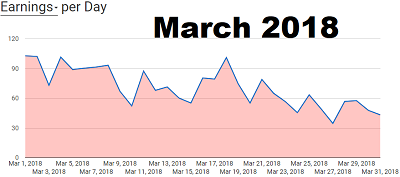 The first half of March was a crazy ride. I doubled down on UK ads. Once I got there and realized how profitable they can get, I focused on producing new ads as soon as possible. One by one, I invited my most promising customers to that market.
The first half of March was a crazy ride. I doubled down on UK ads. Once I got there and realized how profitable they can get, I focused on producing new ads as soon as possible. One by one, I invited my most promising customers to that market.
A few of them declined; a couple of them probably because they felt like paying 50% of profits was too much. Well, that was their choice, but I think 50% of more is much better than 100% of nothing.
I ended up onboarding five of my customers into UK ads. I got busy creating ads for them as well.
It was a revenue-generating activity; not very creative, but profitable. Those ads consumed practically all my spare time.
I was also very active in a FB group of authors involved with AMS advertising exchanging insights with my peers.
UK Discoveries
I ran a few experiments. I discovered that it’s easier to create single ads with all of my books instead of trying to replicate what was going on the US market -one book per one keywords set.
Perception of Christianity
The UK is much less Christian-friendly than US. Master Your Time got a negative review and basically it said “how this Christian author dared to say about prayer in time-management book.”
One of my customers writes Christian fiction books and they sold really poorly in the UK. They were dead on Amazon.com, hovering around #1 million rank, but they were resurrected. They are generating dozens of sales in the US. Not in the UK though.
Negative Reviews
BTW, I discovered the hard way how much negative reviews carry in the UK. Master Your Time stopped selling after that negative review. The same goes for Directed by Purpose. In the end, I begged my subscribers for more reviews and I got some. Begging is the best review-generation tactic 
Are you curious about a 3-month delay? I explained it in ...
Are you curious about a 3-month delay? I explained it in my first income report.
 The first half of March was a crazy ride. I doubled down on UK ads. Once I got there and realized how profitable they can get, I focused on producing new ads as soon as possible. One by one, I invited my most promising customers to that market.
The first half of March was a crazy ride. I doubled down on UK ads. Once I got there and realized how profitable they can get, I focused on producing new ads as soon as possible. One by one, I invited my most promising customers to that market.
A few of them declined; a couple of them probably because they felt like paying 50% of profits was too much. Well, that was their choice, but I think 50% of more is much better than 100% of nothing.
I ended up onboarding five of my customers into UK ads. I got busy creating ads for them as well.
It was a revenue-generating activity; not very creative, but profitable. Those ads consumed practically all my spare time.
I was also very active in a FB group of authors involved with AMS advertising exchanging insights with my peers.
UK Discoveries
I ran a few experiments. I discovered that it’s easier to create single ads with all of my books instead of trying to replicate what was going on the US market -one book per one keywords set.
Perception of Christianity
The UK is much less Christian-friendly than US. Master Your Time got a negative review and basically it said “how this Christian author dared to say about prayer in time-management book.”
One of my customers writes Christian fiction books and they sold really poorly in the UK. They were dead on Amazon.com, hovering around #1 million rank, but they were resurrected. They are generating dozens of sales in the US. Not in the UK though.
Negative Reviews
BTW, I discovered the hard way how much negative reviews carry in the UK. Master Your Time stopped selling after that negative review. The same goes for Directed by Purpose. In the end, I begged my subscribers for more reviews and I got some. Begging is the best review-generation tactic 
May 26, 2018
How to Become the Best Version of Yourself?
 I study successful people. I guess they mastered the art of being a better version of themselves than they were yesterday. So, I’ll discuss their methods.
I study successful people. I guess they mastered the art of being a better version of themselves than they were yesterday. So, I’ll discuss their methods.
These are my conclusions. I may be wrong, I may not cover all the angles, but these are the most common habits I found among successful people.
You are unique, so the habits you’ll use to improve yourself will be unique. I have studied successful people and I found six common areas they focused on. Whether they succeeded in sports, art, business or spirituality, these themes repeated themselves.
Thus, my advice is to develop habits in those six areas. I don’t see how you can improve those things and not improve yourself.
Self-knowledge.
It’s pretty hard to become a better version of yourself if you don’t know what you are improving on. To map out your journey you need a starting point as well as destination. And because you change all the time, you should study yourself all the time.
“Success in the knowledge economy comes to those who know themselves–their strengths, their values, and how they best perform.” — Peter F. Drucker
The habits that can help you in this area:
a) Meditation
There are zillions of benefits to meditation, including increased focus and finishing at a lower blood pressure. Of these, I consider self-awareness the biggest benefit. Usually, you just automatically respond to your subconscious thoughts. Meditation makes you aware of those thinking patterns and allows you to step between the impulse and your response.
b) Journaling
Capturing your self-talk on paper is very enlightening. It’s a powerful tool to clarify your thoughts and to gather plenty of data on yourself.
I journal six days a week and review my entries on Sundays. Sometimes, I write about my emotions and recent events, but always from the perspective of asking why this small trigger released such a strong emotion or what caused me to behave in such a way yesterday.
But most often, I simply research my internal world, journaling about my doubts, dreams, fears, aspirations, etc.
While meditation gives you self-knowledge on emotional level, journaling gives it on both emotional and intellectual levels.
Health.
A successful person rarely doesn’t care about their health. It was more common in the past, when people moved more and were eating real food, not the semi-chemical crap we consume now.
But even back then folks like Benjamin Franklin recognized the importance of exercise and diet. Nowadays, health and success are almost synonyms. Of course, you can be sick and still become a better version of yourself. It is simply much fricking harder.
My friend, Rebecca Patrick-Howard has a rare genetic disease and is dying much faster than most of us. Yet, she also moved from depression and being broken into the realm of successful authors who support their family from writing in a few short years.
I’m a very healthy person, but I don’t sell as many books as she does. I cannot imagine how I could’ve succeeded with my books while battling with constant pain and dozens of pesky afflictions connected to her disease.
With today’s health fad we all know what to do to improve our health. You know it too. It’s time to do, instead of contemplating.
a) Exercise
Every single day. We are spiritual creatures in physical bodies. We need to move our bodies to stay in decent shape.
b) Eat Well
There are plenty of different diets. Some of them come from religion or lifestyle choices. But there is one truly healthy rule: eat as many unprocessed foods as possible.
What’s “processed?” You know this as well. An apple was on a tree a few days ago. A pizza was not.
c) Sleep Well
Eight hours a night is a rule of thumb. Sleep needs are individual. Some people need more (for example, Matthew McConaughey sleeps 8.5 hours a night), some people need less (I’m fine with 7-7.5 hours of sleep). Humans in natural conditions sleep 6.5 to 7.25 hours.
Find your sleep needs and get enough sleep.
d) Stay Hydrated
Dehydration is one of the modern world’s curses. Another rule of thumb is drink 8×8 ounces or 2 litres of water a day. Those needs are individual too. A tiny gal needs less water than 7-feet ogre.
And don’t drink empty calories (soda). That’s not a path to good health.
Networking.
Successful people deliberately network with others.
“Your network is your net worth.” ― Tim Sanders
Your worth is not only monetary. I think, the financial aspect is the least important. Your self-worth is determined to a huge degree by the people you associate with. Successful people understand that and that’s their primary motivation for cultivating their network.
Helpful habits:
a) Thank You Notes
People don’t even take time to thank others nowadays. You will stand out using this simple technique. Handwritten thank-you notes are more powerful. They’re rare in the digital age.
You can send a short audio or video. They’re more powerful than a simple email.
b) Testimonials
Testimonials are like public thank you notes. Write reviews, give testimonials, share them on your social media. The receiver will appreciate it.
c) Collaborate
It always pushes the envelope a bit. When you have to work on common projects your level of interaction increases naturally.
d) Spend Time
This simple networking method always works. You should apply it especially with the people you look up to. The more you can be around your mentors, the faster you will emulate them in your life.
Vision.
Successful people are obsessed with their vision, whatever it is. But first they need to create one. That’s why I started with self-knowledge. It takes some soul searching to discover (Victor Frankl said “detect”) your life mission.
Once they realize what they want to achieve, they keep that vision in front of their mind as often as possible. Average people are often amazed by the drive of successful people. But this drive is not a result of a single enlightenment, as we like to imagine. Successful people habitually refer to their vision every day.
Useful habits:
a) Personal Mission Statement
Well, you need to first create one. Once you have it, there are many methods to use it. You can read it, listen to it, repeat in your mind, visualize it and so on. The point is to refer to it every single day, so your mission is always in your mind’s agenda.
b) Vision Board
Humans think in images. If you have a visual reminder of your purpose, you can look at it multiple times a day.
c) Visualization
You can simply imagine the joy of fulfilling your purpose. Visualizing yourself in the process of getting there would be even better.
Education.
The biggest mistake you can make is to think that you are finished learning when you earn your degree. Education is a lifelong process.
“Formal education will make you a living; self-education will make you a fortune.” – Jim Rohn
And it is you who have to take charge of your education. Today’s education systems are outdated and expansive. What is more, you need proper learning habits. It’s no longer about appearing in the class 5 days a week. It’s about studying on your own as often and long as needed.
Handy habits:
a) Reading
Read books, blog posts or articles in specialized magazines- whatever makes you more knowledgeable about your subject.
b) Listening
YouTube has countless hours of useful lectures, workshops and speeches. You can convert them into audio and listen to them while doing semi-mindless tasks like driving or washing dishes.
c) Watching
It’s not my cup of tea, but there are people who learn well from watching videos. If that describes you, go for it.
d) Teaching
You retain more if you teach what you’ve just learned, because you create more associations to your knowledge. Also, your students may challenge your assumptions and you need to reflect on your knowledge base to come up with convincing arguments.
e) Doing
There is no better learning method than practice. Each time you use your knowledge you gain experience and create more associations. Practice makes you also a better teacher. Internalized knowledge is four times easier to transfer than dry theory.
Habits.
Successful people recognize the utmost importance of habits in their lives. They don’t let their habits be a conglomerate of social and physical environment. They consciously work on avoiding bad habits and developing good ones.
Your beliefs become your thoughts,
Your thoughts become your words,
Your words become your actions,
Your actions become your habits,
Your habits become your values,
Your values become your destiny.
― Mahatma Gandhi
I don’t have useful habits here for you. My point is, you need to analyze, develop and maintain your habits. Self-knowledge and education are very handy for accomplishing that goal.
I have two great resources for you:
a) Tiny Habits course which is free, short and easy. It also teaches the basics of habits development by implementation and experience, not pure theory.
b) My blog post series Infallible Framework for Habit Development explains in great details all the necessary elements to develop lasting habits. When I stuck to this framework, I always succeeded. When I didn’t follow it, the output wasn’t as good.
The post How to Become the Best Version of Yourself? appeared first on ExpandBeyondYourself.
May 15, 2018
What Daily Habit Will Make Your Life Simpler? (4 Examples)
The Slight Edge chart
Every habit makes your life simpler… unless, of course, it complicates your life. There is no middle ground here. Each habit either serves you, provides some benefits and makes your life a bit simpler OR does you a disservice and ruins your life.Bottom line, good habits, even the most trivial ones, make your life simpler because you don’t have to use brainpower for everyday activities. When I come into my home, I automatically take off my shoes. I don’t deliberate if I should do it or not. Boom! and I have no shoes on my feet. It doesn’t take even an ounce of my brainpower.
OK, a few examples to illustrate simplicity achieved via daily habits.
I exercise every day
I’m pretty fit for a 38-year old guy who sits on his butt for 10-14 hours a day. Have you any idea how much simpler it makes my life? I usually have all the energy I need to deal with my day job, business and family obligations.
I am in a mastermind with 9 other guys. They are all pretty successful, but a few of them DON’T exercise daily.
Their life is more complicated than mine. They deal with small issues like being a tiny blow to self-confidence because they are overweight several pounds or getting sick more often. And each time they are about to exercise, it’s a big deal for them: Should I or not? Now or in 5 hours? Go to the gym or go jogging?
The lack of routine complicates their life enormously comparing to my life.
Every morning, I gulp two glasses of water
It shields me from dehydration. Only one thing I noticed in connection to this made my life so much simpler!
Namely, I don’t have headaches anymore.
When I was a teenager, I suffered from terrible migraines. They became less frequent in my twenties and thirties. I remember the last attack in 2012. I had to lie down on the floor not to collapse or vomit from pain.
Hydrating myself first thing in the morning cured me from that. The only times I get a headache are when I do something stupid, like drinking too much alcohol.
Life without headaches! It’s so much simpler.
I keep a gratitude journal
As a result, every measurable output in my life has risen dramatically. I have more and better relationships, I sleep less, am stronger, earn more, save more, read faster and so on.
Do you have any idea how much simpler your life is when everything is 15-20% better?
Well, I think scientists who measured the effects of gratitude took a short-term approach. I practiced my gratitude discipline and many other habits for more than five years. I beat over 200 fitness records in that period. My income more than doubled. The effects are better than 15-20%.
I journal six days a week and review my entries on Sundays
This easy habit made my life so much simpler. The volume of unprocessed emotions and issues boiling inside me went significantly down. I also became better at recognizing what gnaws me inside and in controlling my self-talk and emotions.
Imagine your life with your inside drama scaled down to a fraction of what it is. No more self-pity, self-loathing, blaming yourself and other people for everything that happens in your life. Less anger, jealousy and resentment.
It makes my life so much simpler!
The post What Daily Habit Will Make Your Life Simpler? (4 Examples) appeared first on ExpandBeyondYourself.
May 4, 2018
Fifty Ninth Income Report – February 2018 ($4029.6)
Are you curious about a 3-month delay? I explained it in my first income report.
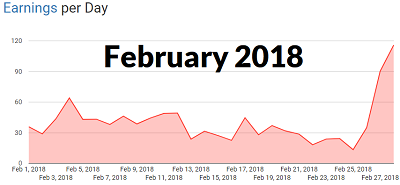 February 2018 was an interesting month. I started officially working half-time in my day job!
February 2018 was an interesting month. I started officially working half-time in my day job!
And it was a disaster. My productivity went through the window. It was especially visible in my publishing schedule. Well, there was no schedule and it was visible. I published maybe a couple pieces outside of my blog and three posts on the blog.
Compare this to 30 pieces published during the Real Artists Don’t Starve challenge, and you get what I mean by a “disaster.”
My wife just loved to have me around and boss me around. I didn’t mind seeing kids off to school, making her the morning coffee, doing small household chores and so on. I only minded that it all left me little time for anything else.
And I hated distractions. My wife loved to drop into my home office to show me some meme from Facebook.
I’m an introvert. I thrive when I’m alone. I do my best work alone.
I wasn’t alone anymore, and it showed in my output.
Writing to a Drawer
Nonetheless, I kept writing. Only, I had no time to process my work. So, I accumulated drafts on Quora and other articles on my hard drive. I couldn’t find the time to send them to my proofreader. I sent her only one batch, but a huge one, with about a dozen Quora answers.
I’m writing this report at the end of March, and I still haven’t published anything written since the beginning of February (other than a few blog posts on ExpandBeyondYourself and one or two book reviews).
Heck!
AMS Services
Part of the reason why I had no time to process my writing was an onslaught of authors. I replied to dozens of emails and got three new authors. I started ads for one of them only at the beginning of March, but the whole preparatory process took place in February.
The second customer had three crime novels and, after running ads for the whole month, we concluded that they don’t break even. I think we lacked five bucks to balance the sheets. We split at the end of the month.
The third customer had one nonfiction book to advertise and it did pretty well, finishing with over $70 profit after running the ads for only a couple of weeks.
Also, one of the past customers returned to me with his book. He dropped the price to 99 cents in hope that it would sustain his sales, but he had no luck with this tactic. So, we priced it again at $2.99 and restarted ads for the book. Unfortunately, Amazon still didn’t like his book and didn’t give it many impressions.
Out-cheating PayPal
One of the prospects who finally declined my AMS services was interested in rewriting her 4 book descriptions. I gave her a prohibitive quota, but she happily accepted the price. So I outsourced the work to my proofreader/copywriter. I took care only of generating HTML for formatting the descriptions in the KDP dashboard.
I also used this opportunity and tried to out-cheat PayPal.
PayPal, with their ‘transparent fees’ eats up about 6% of my earnings. About 3-4% of that are their outrageous currency rates exchange. And I’m forced to exchange currency each time I withdraw money into my bank account, just because they say so. I don’t buy even a word from their explanations, because their competitors happily let me withdraw money in any currency, and their fees are lower.
So, I created a bank account in the USA via Transfer Wire. I created the USA PayPal account and connected it to the TW bank account. The two verification transfers went through without problems. But when I tried to withdraw $1,000 to the USA bank account, PayPal said that the bank refused the transaction. I called Transfer Wire support. They said they didn’t even notice an attempt to transfer a larger sum.
And PayPal blocked my American account for half a year. My attempts to resolve this issue resulted only in canned autoresponder answers from their support.
I ended up with the advance for book descriptions frozen for a half a year, and I had to pay my copywriter out of my pocket.
Thank you PayPal. I’m going to ask my biggest customers to pay me via wire transfers.
Steep Decline of Book Sales
My sales would have dropped 30% month to month if not for a single event that I’ll talk about at the end of this post. They dropped 20% nonetheless. The decline was mainly a result of a lower ads performance in February 2018. It hit my customers even harder. My AMS revenue (read: their revenues from ads) declined by 36%.
Well, it was at the all-high level in January 2018, and I was busy dealing with new prospects and fighting with my sudden lack of productivity. I did almost nothing to reverse the situation.
“Almost” refers to testing about 30,000 new keywords. But it took time. I ran them for my books and a few books of my customers. In February, it didn’t result in anything more than material for reassuring messages to my concerned customers.
Book Royalties
And I didn’t need to be immediately concerned because in February, I received Kindle royalties from December 2017 and CreateSpace royalties from January 2018 – the two fattest month of the year.
Create Space revenue was still artificially inflated by the pricing trick. Only 2-3 books enjoyed the higher prices sponsored by Amazon, but it provided about 40% boost in dollars.
And, despite the decline, my AMS income was still high enough to replace my wife’s past day job salary. For the time being, I had nothing to worry about.
Advertising on Amazon.co.uk
On 26th of February, I discovered how to create an AMS account in the UK. By 7 pm my time, I had a couple of ads for my 10 books running there. Before midnight, I sold 5 copies. That was about as many as I sold in the whole of February till that point in time.
Needless to say, the next day I spawned a few dozen campaigns. My Kindle sales in the UK reached 39 and 51 copies on 27th and 28th of February respectively.
It was like striking a gold lodestone. Ads in the UK are a bit different than in the USA. The main difference is that they have no blurbs. All that is displayed are a cover, a title and the review rating. I’m definitely a subpar copywriter, so this actually increased my chances. And I had thousands upon thousands of keywords tested in the US.
Lack of blurbs meant that more people clicked on ads only out of curiosity. The click-to-purchase ratio was low. I was used to it. That was my basic assumption when running low-bid ads in the USA.
I was able to capitalize on everything I learned in the last 1.5 years of running ads in a single day.
The number of impressions and clicks were unbelievable. And the best was that I got free £100 for advertising for creating the account! I made about $300 from it. The free credit lasted for only 3-4 days for me.
And I haven’t even mentioned paperback sales that exploded as well. Running those ads added about $300 to my bottom line in just 53 hours of February.
That was a really happy end of the month.
The Income Report Breakdown
Income:
Amazon royalties: €1152.98 ($1429.69)
CreateSpace royalties: €1389.11 ($1722.5)
Coach.me fees: $509.35
Draft2Digital royalties: $17.86
Audiobooks royalties: $161.19
PWIW personal coaching: $263.69
AMS service remuneration: $1421.87
Total: $5526.15
Costs:
$29, Aweber fee
$20, InstaFreebie fee
$101, proofreading
$111.1, royalties split with co-author
$105.53, my editor’s share in profits
$714.35, Amazon ads
$84, RAs’ (RAs = Real Assistants; my sons 
April 27, 2018
How to Build Willpower, Self-discipline and Perseverance?
 One can build willpower by eating only a millet for two weeks. One can build self-discipline by taking cold showers 10 times a day. One can build perseverance by maintaining the same workout regime (e.g. a 5-mile run) every single day.
One can build willpower by eating only a millet for two weeks. One can build self-discipline by taking cold showers 10 times a day. One can build perseverance by maintaining the same workout regime (e.g. a 5-mile run) every single day.
There is zillion ways to build those traits, however 99% of them are not really applicable for average mortals. Thus, let’s talk about some things that can help you starting with little to no willpower, self-discipline or perseverance.
First, it will be amazingly useful, if you can shift your thinking about those traits. Normally, those traits are considered something above-human, difficult and tiresome.
In reality they are simply character qualities, like any other (picture self-confidence, patience or diligence here). What is more, it’s much easier to develop and maintain them than to struggle through life without them. Take a closer look at below chart:

The Slight Edge chart
Lack of discipline or inconsistency move you further along the downward curve, straight to failure and a life failure at that. It is enough to develop the traits in question and you will automatically switch into the upward curve and your life journey will be accelerated the longer you practice them.
Yes, it’s tiresome to build those qualities, but only in short-term. In the only meaningful time horizon in human life – decades – those traits are actually much easier to live with.
According to BJ Fogg, the head of Persuasive Lab on Stanford, the only reliable way to change yourself for good is to modify your habits. He even claims, that the only reliable way to create new habits is to develop them in incremental tiny steps. He called this method “Tiny Habits.” I highly recommend you take his free course:
Tiny Habits w/ Dr. BJ Fogg
The course covers starting three habits, ideally for your purposes. Pick one thing you don’t really like, so you will train your willpower.
Pick one thing that has to be done in a disciplined way, e.g. weighing yourself, paying bills or tracking your expanses. This one will help you with self-discipline.
Pick one thing that you want to do for the rest of your life, for example exercises. This habit will build your perseverance.
The Tiny Habits course will teach you how to develop those three habits not by theorizing, by practice. In a week you will have nucleus of three new habits that will cultivate the three traits you want to build.
The Art of Persistence
Here comes the silver bullet: focus on perseverance and the two other qualities will follow. When I started turning my life around and building new habits I had no regard for willpower or self-discipline whatsoever. I still have them in a little esteem.
By external standards I have an iron willpower and am self-disciplined like a Marine. But I don’t care about this at all. I focus solely on perseverance.
At the beginning I took on faith the Slight Edge model (see the chart above) as a probable approximation of reality. In a couple of months I became convinced that this IS reality. Thus, I have been caring only about doing my daily disciplines.
I didn’t care if doing them cries for exercising willpower or not. Some of them were very easy for me (like reading a book written by a saint for 10 minutes a day), some were excruciating (like studying professional documentation for 10 minutes a day). I was interested only in the output: did I do them or not? Nothing else mattered for me.
I was obsessive about doing my habits every day, I built habit streaks like crazy. Breaking a consecutive streak of my habit was unimaginable for me. When I finally broke a few it was a cause for a mild depression and self-loathing sessions 


